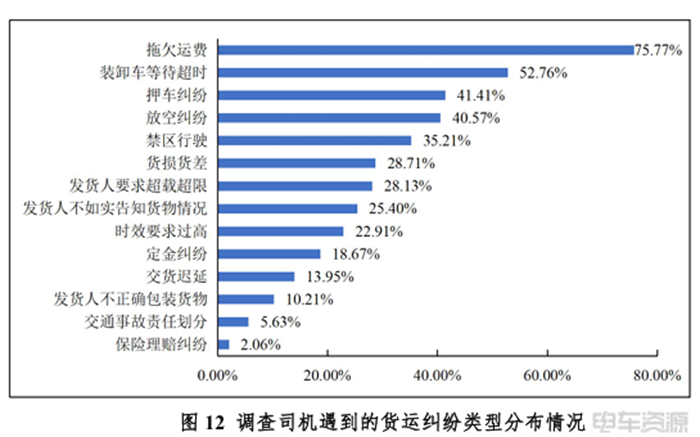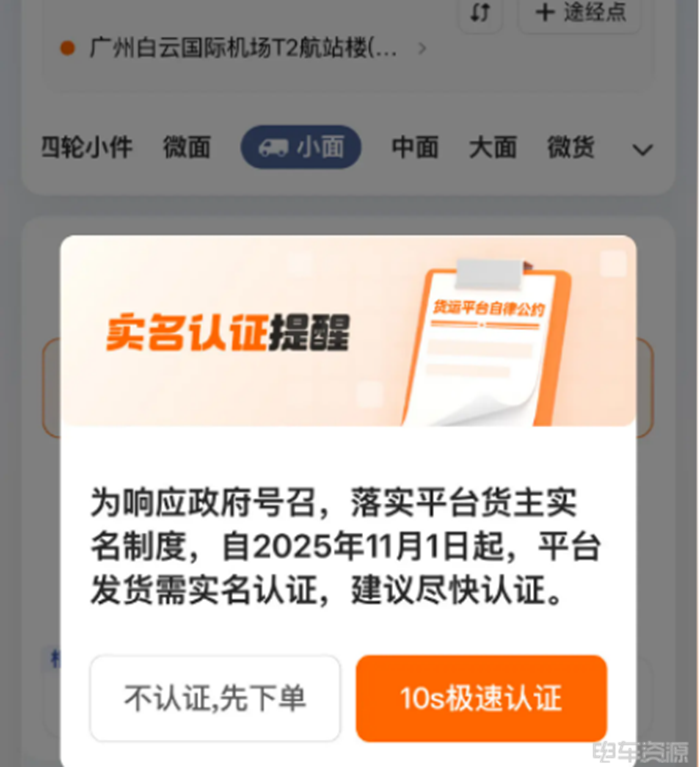"Platform 'Advances Freight Charges', Shippers Real-Name System, Who Can Win the Drivers' Hearts?"
What should I do if I don't receive the freight charges? How can I avoid fake orders? What should I do about the platform's arbitrary deduction of behavior scores? These unreasonable rules troubling many drivers on freight platforms are being rewritten.
With the promotion of the "Self-Discipline Agreement for Protecting the Legal Rights and Interests of Truck Drivers on Network Freight Information Transaction and Matching Platforms" (referred to as the "Self-Discipline Agreement"), the four major mainstream network freight platforms—Huolala, Didi Delivery, Manbang Group, and Kuaigou Taxi—are taking action under regulatory pressure and internal challenges. In addition to completing the mandatory "specified actions" from higher authorities, they are also actively contributing their own unique "optional actions."
As the incremental dividends reach their peak, whether voluntarily or due to regulatory pressure, network freight platforms are collectively turning their attention to the group that was once regarded as the "lifeblood" of the platform—the drivers. Forced commission reductions, real-name registration for shippers, "freight prepayment," AI safety monitoring, and liability algorithms... In today's industry, which has transitioned from extensive expansion to deep cultivation of existing markets, the same-city freight sector is undergoing a silent shift.
Disordered freight rates, fluctuating capacity, and the value of stock.
Platforms collectively shifting their focus towards driver retention is essentially a proactive resolution and strategic adaptation to multiple deep-rooted contradictions within the industry. The primary contradiction lies in the negative cycle formed by disordered fares and high driver turnover.
Disordered freight rates. In recent years, the accelerated popularity of new energy logistics vehicles and ride-hailing services, combined with the influx of labor into the flexible employment market during the economic downturn cycle, has led to a structural imbalance in the market characterized by "more vehicles than goods." Freight rates have consistently remained low, resulting in declining driver incomes. Many individuals find themselves in a survival predicament of "unable to cover costs by working, yet unable to stop monthly payments."
According to research data from the 58 City Recruitment Institute, 64% of drivers attribute their turnover to "low order volume and difficulty in guaranteeing income," while 46% mention "high operating costs." This imbalance between income and costs directly leads to high driver turnover in the industry—66% of drivers under logistics companies have an average tenure of less than six months.

Image source: "2025 Survey Report on the Employment Status of Truck Drivers"
Moreover, the cost differences in the competition for existing resources have also fundamentally changed the strategic logic of the platforms. The cost for a leading platform to recruit a new driver is 3-5 times that of retaining an experienced driver. It is well-known that the internationally accepted customer retention principle indicates that the cost of retaining existing customers is usually 5-7 times that of acquiring new ones. Furthermore, experienced drivers provide more standardized services, are familiar with the routes, and have lower complaint rates, which can directly enhance user experience and bolster the platform's brand reputation. This shift from competing on "the quantity of capacity" to "the quality and stability of capacity" compels platforms to adopt differentiated strategies to stabilize their core resources.
The instability of transportation capacity reflects a subtle shift in the driver community's perception of this profession. The "high income bubble" inflated by platforms through generous subsidies has long since burst. With the retreat of subsidies, opaque commission rules, and an increasing societal awareness of the "high load, high risk" nature of the driver profession, the appeal of this job for newcomers is diminishing. More people now view truck driving merely as a temporary "stopgap job."
Didi vs. Huo La La: A Practice of Two Paths for Capacity Assurance
In the first quarter of 2025, Didi Delivery proposed the "Capacity Quality Improvement Plan," incorporating driver retention rate into core assessments. The "Freight Advance Guarantee" service was officially launched only in October. According to the rules, for freight collect orders where the shipper has not paid after more than 7 days, the platform will automatically advance the full amount to the driver and intervene for payment collection after 24 hours overdue. This mechanism has proven effective, increasing weekly driver retention rates by 12% in pilot cities, with related topics garnering over a hundred million views on social media platforms.
On November 1st, Huolala fully implemented a real-name authentication system for cargo owners, preventing those who have not completed the authentication from posting cargo information. On November 4th, the company publicly disclosed its platform algorithm for the fourth time, unveiling its AI safety prevention and control as well as AI responsibility determination systems. This self-developed AI system serves as the technical support for the plan, capable of real-time identification of scenarios such as the transport of hazardous materials and illegal passenger carrying, and implementing automatic interventions. After an order is canceled, the AI responsibility determination system can directly assess that the driver is not at fault in clear rule scenarios, reducing the time for responsibility determination from 72 hours to 48 hours and decreasing the volume of risky orders by 30%.

However, the advance payment mechanism of Huolala has not been fully disclosed in terms of specific operations, such as application conditions, advance payment ratio, and time to receive funds. Drivers still need to apply for compensation under certain conditions after unsuccessful payment reminders, making the process less certain compared to Didi's automatic advance payment.
The two strategies reflect different operational logics: Didi alleviates drivers' financial pressure through "advance payment," directly enhancing retention; while Lalamove focuses on building a governance system with "technology + rules," aiming at ecological purification and service standardization. This collectively indicates a shift in industry competition from traffic acquisition to capacity stability and experience optimization.
How do drivers see it?
"Burning money through subsidies" cannot solve all problems. Both Didi and Huolala are still exploring development paths suitable for their respective platforms and have not yet formed a fully replicable mature model. The market's feedback on the two has also shown different trends.
According to a survey conducted by Electric Vehicle Resources among frontline drivers, the operational strategies of two platforms have elicited a complex range of responses within the driver community—both recognition and concern coexist. Among these, the order advance payment mechanism introduced by Didi Delivery has gained widespread approval among drivers. This is particularly true for those who rely on daily cash flow to cover fuel and rent expenses, as the advance payment feature allows for quick access to freight payments. This form of support, which directly addresses the economic pain points of drivers, has, to some extent, enhanced their sense of job security and satisfaction with the platform.
However, some drivers have pointed out that although the advance payment solves the "difficulty in receiving payment," it has not addressed the core issue of "few orders and low prices." Some drivers have reported that the platform is still not transparent enough regarding the commission rate and order distribution mechanism. Coupled with the increasingly stringent service score assessments, this has resulted in a gap between income expectations and compliance pressure.
Huolala's strict review system and real-name policy have received polarized evaluations. Compliant veteran drivers generally support it, believing it effectively filters out bad practitioners and purifies the operating environment. However, many drivers complain that the review process is cumbersome and the liability standards are stringent, often affecting service scores due to reasons beyond their control. More critically, the increase in service requirements has not been accompanied by a rise in freight rates, creating a common grievance among drivers.
From managing drivers to managing people's hearts
In the past, platforms relied on subsidies and low-price strategies to attract massive transportation capacity, which was a rough model of exchanging scale for growth. Now, the industry has clearly realized that unstable transportation capacity and chaotic pricing will only worsen each other, ultimately leading to the collapse of the entire ecosystem.
Both Didi and Huolala are taking measures that, although different in approach, essentially aim to "optimize" and "deepen" their existing pool of drivers. Whether through financial support to enhance driver loyalty or by upgrading standards to select high-quality transportation capacity, the goal is to establish a healthier and more sustainable supply-demand balance.
However, truly capturing the hearts of drivers goes far beyond unilateral rule-making or the transfer of benefits. It requires the platform to fundamentally change its mindset—viewing drivers as ecological partners, rather than merely as tools for transportation capacity.
【Copyright and Disclaimer】The above information is collected and organized by PlastMatch. The copyright belongs to the original author. This article is reprinted for the purpose of providing more information, and it does not imply that PlastMatch endorses the views expressed in the article or guarantees its accuracy. If there are any errors in the source attribution or if your legitimate rights have been infringed, please contact us, and we will promptly correct or remove the content. If other media, websites, or individuals use the aforementioned content, they must clearly indicate the original source and origin of the work and assume legal responsibility on their own.
Most Popular
-

BASF Signs Another Giant: Covestro Already Set Up, Just Missing Wanhua Chemical?
-

Clariant Plans to Shut Down Multiple Plants! Wingtech Releases Latest Statement! Oriental Yuhong Acquires Stake in Brazilian Company
-

Clariant Unveils Cost-Cutting Plan Details, Plans to Shut Down Multiple Plants
-

ExxonMobil Plans to Close UK Ethylene Plant; GPI's Revenue & Profit Both Decline! Haitian's Serbia Base Enters Mass Production
-

Ineos Styrolution Closes French Plant! UK Lincolnshire Plans £35 Million Waste Plastic Recycling Facility






